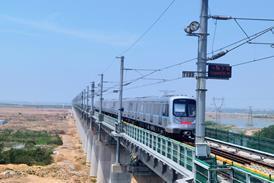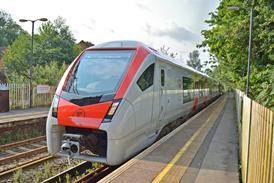FOUR civil engineering contracts were initialled on January 10 for construction of around a third of the 345 km Taipei - Kaohsiung high speed line. They will come into force when the financial package for the project is agreed, which is expected before the Chinese New Year starting on February 5. This in turn is likely to depend on the outcome of a legal battle launched on January 12 when the Franco-German Eurotrain consortium announced that it was seeking an injunction against Taiwan High Speed Rail Corp’s decision on December 28 to give priority negotiating rights for the electrical and mechanical package, including rolling stock, to a Japanese group trading as Taiwan Shinkansen Consortium. The trains would probably be a derivative of the Series 700 shinkansen sets (p82).
Eurotrain, formed of Alstom and Siemens, was chosen as preferred bidder for supply of rolling stock and other E&M equipment in 1997, and it staged a successful demonstration of its proposed train design formed of ICE power cars and double-deck TGV trailers in May 1998 in Germany (RG 6.98 p411). Not long afterwards, on July 23 1998, THSRC and the Ministry of Transport signed an agreement for the US$17bn project to proceed as a build-operate-transfer concession. But Eurotrain did not sign a formal contract, and THSRC contends that the Europeans’ willingness to bid against the Japanese group formed of Mitsubishi, Kawasaki Heavy Industries, Toshiba, Sumitomo, Marubeni and Mitsui & Co was tacit acceptance that the earlier agreement awarding Eurotrain preferred bidder status was not binding. If this view is upheld by the Taipei District Court where the injunction was lodged, Eurotrain’s chances look pretty slim.
The European team was showing signs of serious concern by mid-January, dispatching Siemens AG chief Heinrich von Pierer to Taipei to lobby Taiwanese President Lee Feng-hui and Premier Vincent Siew, but both apparently insisted that the choice of supplier was a matter for THSRC.
Just why THSRC changed its mind is not clear. There are suggestions that Japanese banks may provide a loan worth up to ´300bn if TSC wins the day, but something else may turn out to be the deciding factor. A violent earthquake last September caused Taiwan Railway Administration quite serious damage in at least one tunnel. Japan’s shinkansen are well protected against possible quake damage, and Japanese expertise in this field may have had a strong influence.
Japanese firms are already involved in the civil engineering work: two contracts covering a 50 km section went to Obayashi Corp of Japan and local contractor Futsu Construction; an 18 km section was awarded to Japan’s Daiho Corp with Chiu Tai and Kou Kai; and another section covering around 35 km was awarded to Samsung Corp and Korea Heavy Industrial & Construction Co. n




















